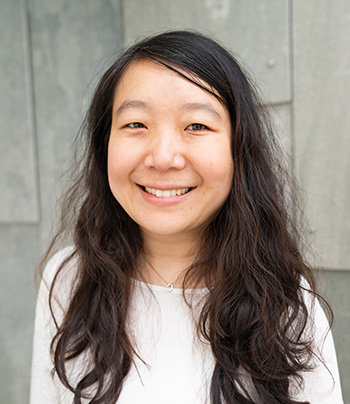Yuan Ping, associate professor of chemistry and biochemistry at UC Santa Cruz, leads one of eight research projects funded by the U.S. Department of Energy (DOE) to advance the development of sophisticated modeling and simulation software for the chemical sciences.
Ping’s group received a $1.2 million grant for the three-year project, which builds on her previous work developing computational tools for predicting important properties of materials and molecules based on quantum dynamics. Working with co-principal investigator Ravishankar Sundararaman at Rensselaer Polytechnic Institute, Ping’s team will develop computational techniques and massively-parallel software for the rapidly emerging field of “spin chemistry.”
Spin is a quantum property of electrons that can affect the interactions of atoms and molecules. Spin chemistry involves using the spin of electrons to control chemical reactions. While Ping’s previous work on the quantum dynamics of spin has involved applications in quantum computing, the new project will focus on the impact of spin in catalytic materials and photochemistry.
“We can apply the same theoretical framework and computational tools in a different context to study the effects of spin dynamics on chemical reactions,” Ping said. “If you can control the spin properties, you can change the products or increase the efficiency of chemical reactions. But realizing the promise of spin chemistry requires a fundamental understanding of the mechanisms involved in the effects of spin on charge transfer and chemical reactivity.”
Ping’s group will develop computational chemistry techniques for predictive modeling of spin dynamics and spin-dependent charge transfer, paving the way towards a detailed mechanistic understanding of spin chemistry.
An important aspect of the project is developing software compatible with the most powerful supercomputers. “Supercomputers are so fast now, the speed of the hardware is no longer a bottleneck, but the software has to be designed to fit the exascale computational platform,” Ping said.
Her team will share their computational techniques with the scientific community in open-source code optimized for the most advanced supercomputers. The exascale simulation capabilities being developed by these DOE-funded projects will address a broad range of scientific topics important for clean energy, including carbon dioxide reduction, catalysis, biochemical energy conversion, and clean and sustainable manufacturing.
“The world’s fastest supercomputers, including the first exascale supercomputer ever built, are hosted at DOE National Laboratories,” said Harriet Kung, deputy director for science programs at the DOE Office of Science. “These investments will provide researchers with modeling and simulation software that can deploy that computing power to perform the fundamental research needed to overcome the nation’s clean energy and low-carbon manufacturing challenges.”
The eight funded projects were chosen in a highly competitive peer-review process. Glenn Millhauser, distinguished professor and chair of chemistry and biochemistry at UCSC, said they represent the top computational chemistry programs in the country.
“They will be developing the next generation of computational tools, sure to guide the future of chemical research,” he said. “This is a real credit to Yuan and the impact of her remarkable research program.”



